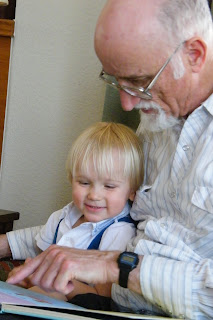 Within the past week, Griffin has experienced another language explosion, this time with sentences. He's saying more and more complete sentences, even joining two complete sentences with "and." (Up till now many of his utterances were missing a subject or some other crucial part of speech.)
Within the past week, Griffin has experienced another language explosion, this time with sentences. He's saying more and more complete sentences, even joining two complete sentences with "and." (Up till now many of his utterances were missing a subject or some other crucial part of speech.)He's gone from "Need me drink the milk" to "I want to boire the lait," for example, and he's more comfortable expressing his preferences: "I love my penis" and "No I don't like that!" (which he said very forcefully in swim class when we tried to put his ears in the water).
Other times, though, his syntax is still tortured and convoluted and only makes sense to someone who knows him very, very well. "Steamboat not here for nager" actually means "We're going swimming, but we're not going swimming in Steamboat Springs like we did last week, because we're not in Steamboat right now."
As far as other parts of speech, he's still figuring out how to express possession in both languages. In English right now, everything is "her"--"Grandad get in her camionette [pick-up truck]," "Daddy with her friends." And he's applying French syntax to English possession, for instance saying "the truck of Grandad" because he's used to hearing my "la camionette de Grandad" and so forth.
And like any two-year-old, he's picking up new words constantly, but not always using them correctly at first. Here's a scene from a department store dressing room last week, where I'm practically tap dancing to keep him from opening the dressing room door while I'm still in my underwear, promising him we can go on the escalator afterwards.
Maman: Et maintenant je vais essayer cette tunique. C'est une sorte de chemise. De quelle couleur est la tunique? [I told him I was trying on a tunic, which is a type of shirt, and asked him what color it was.]
Griffin: Bleu.
Maman: Oui! Bleu! C'est une tunique bleue! Est-ce que tu vois d'autres choses bleues ici?
(Griffin points out other blue items of clothing, then other colors, while I frantically attempt to find a bathing suit that actually fits and occasionally scoop him as he attempts to crawl under the changing room door.)
Griffin, looking critically at me in a black bathing suit: Maman, you need put on the picnique-nique bleue again.
Maman, to herself: I need to put on a blue picnic? What the what? Ohhhh! "Tunic." Not "picnique," he means "tunique." (And apparently this suit is indeed as unflattering as I had thought.)
Griffin tries to escape once again, and Maman gives up on trying on clothes.
Maman: D'accord, Griffin. On va partir maintenant. [Okay, we're leaving now.]
Griffin: Need me go on alligator, Maman! [He said "alligator" with the French pronounciation.]
Maman checks the dressing room for reptiles. Nope, none in sight. What the what?
Griffin pulls Maman over to the moving stairway heading up to the second floor of the department store. Oh! Not "alligator." Escalator. Escalator!
And finally, despite his penchant for saying cute and/or grammatically and/or lexically incorrent phrases with English and French all smushed together, Griffin can also wax poetic:
"Griffin's pants are falling down, falling down, falling down
Griffin's pants are falling down, my fair baby"
 and
and"Avion vole comme un aigle, Maman." (Airplane flies like an eagle.)
Mon cher fils, mon amourson, toi aussi, tu voles comme un aigle, sans jamais quitter la terre.





















